Text
It's frustrating that you can come up with the plot of an entire fic in just a few seconds, but writing it all down can take anywhere from never to forever.
33K notes
·
View notes
Text
Everyone should read their own fanfics recreationally tbh this shit fucking rules. It's like the author knows exactly what I like.
84K notes
·
View notes
Text
re-reading my own fic because the author has exactly my taste in tropes, ships the same ships in the right way, and also shares my sense of humour. what a find, what a revelation. i hope they write more of this sort of thing.
27K notes
·
View notes
Text








Tree roots following the pattern of concrete footpaths
117K notes
·
View notes
Text
It is a painful truth that actually none of my fics are abandoned, no, not even the ones that haven’t updated in five years. I still know exactly what happens next, and after that, and so on. They’re not abandoned; they’re right here, haunting me, characters climbing up my pants like kittens nagging for dinner.
46K notes
·
View notes
Text
heartbreaking. you have to write the fic youre writing in order for it to be written
43K notes
·
View notes
Text
the thing about writing fantasy stories is that language is so based on history that it can be hard to decide how far suspension of disbelief can carry you word-choice wise - what do you call a french braid in a world with no france? can a queen ann neckline be described if there was no queen ann? where do you draw the line? can you use the word platonic if plato never existed? can you name a character chris in a land without christianity? can you even say ‘bungalow’ in a world where there was no indian language for the word to originate from? is there a single word in any language that doesn’t have a story behind it? to be accurate a fantasy story would be written in a fantasy language but who has the time for that
227K notes
·
View notes
Text

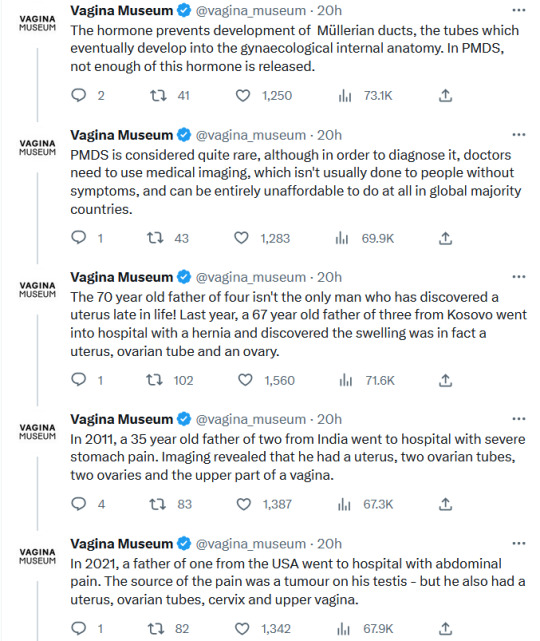
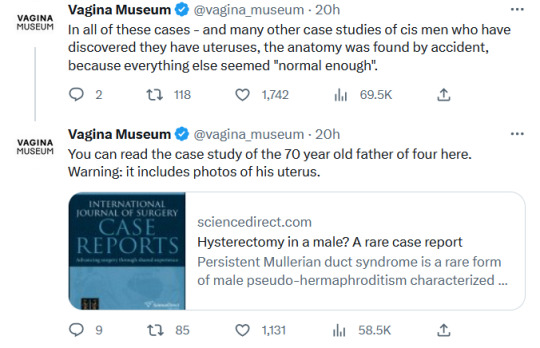
https://twitter.com/vagina_museum/status/1628046312275935232
82K notes
·
View notes
Text
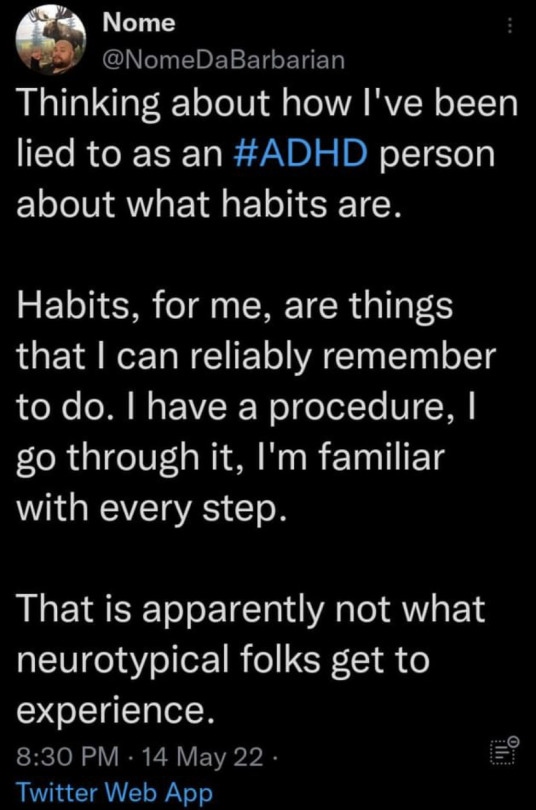
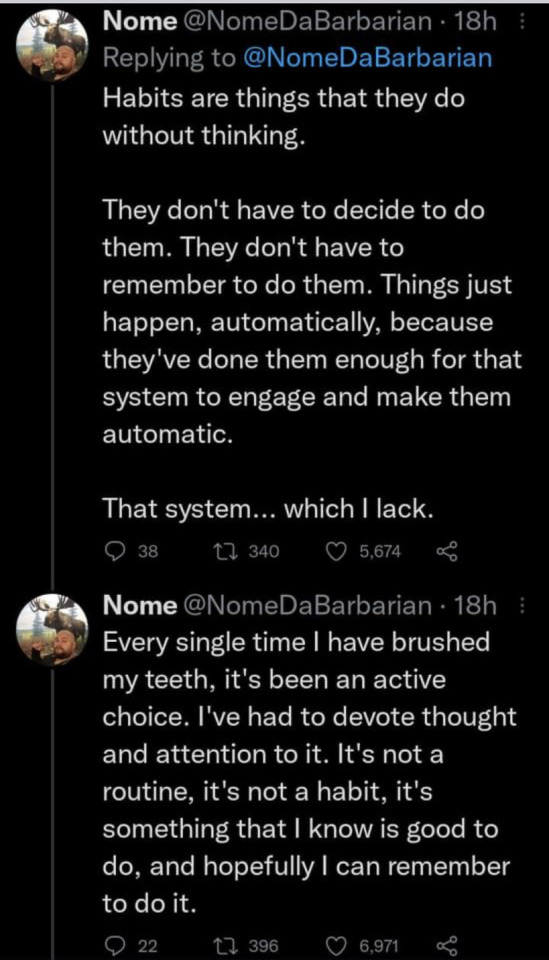
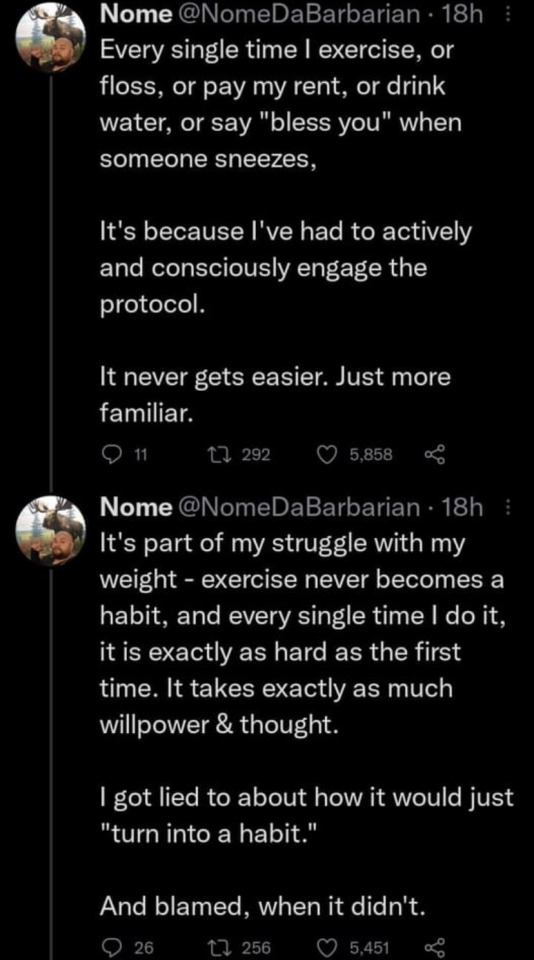
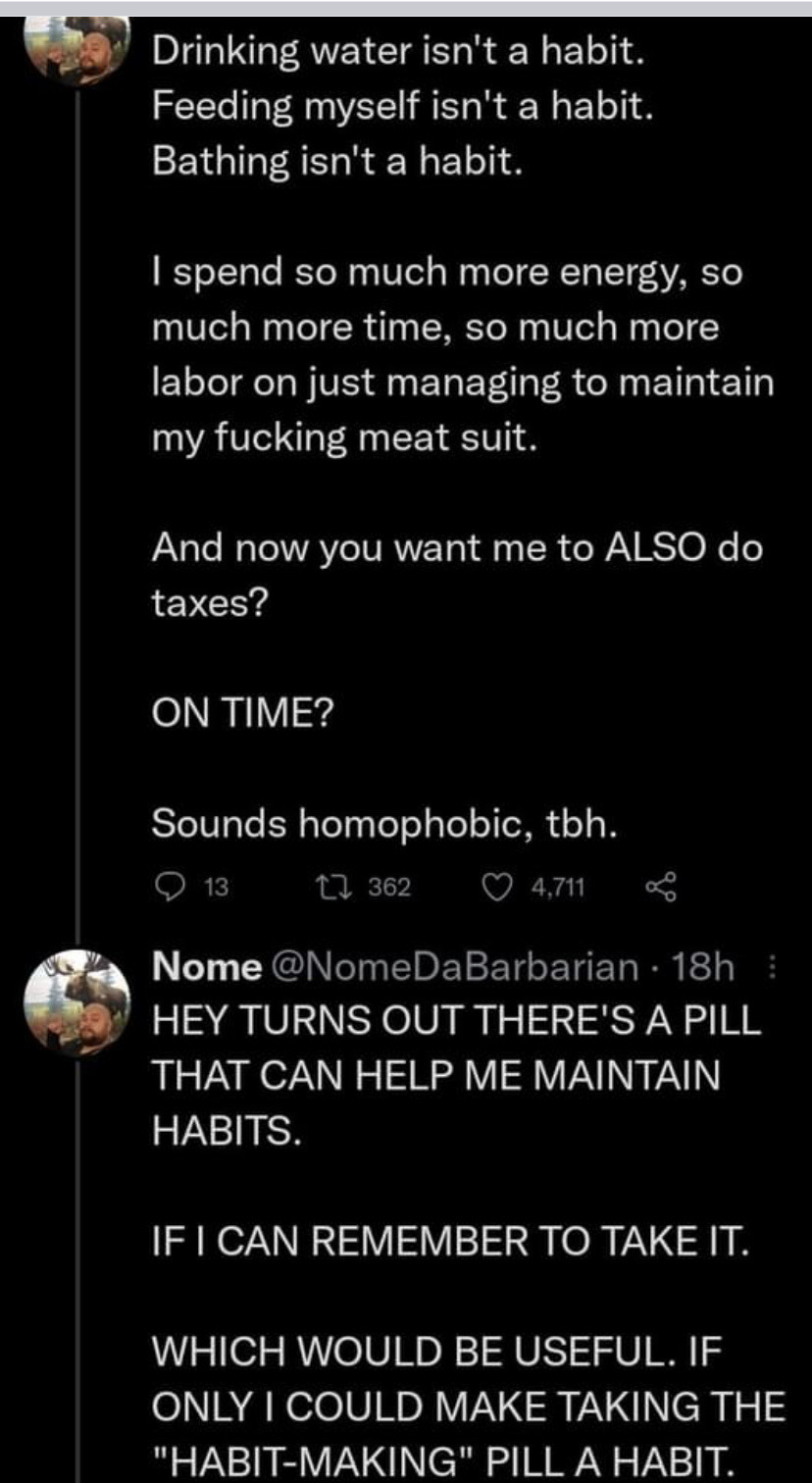
Hi I was today years old when I realized some people truly don’t have to think about every single thing they do. They don’t have to have an imaginary set of rules (I’m not allowed to put on my bra until I’ve brushed my teeth) to function.
54K notes
·
View notes
Text
FAQ on Writing Signed Language
(and deaf/HoH characters)
An amalgamation of all the questions that have come up repeatedly since the original posts. All the people who wanted to be tagged have been put under the read-more link at the bottom.
“Is it okay to use italicized speech for signed dialogue, even if I describe faces and signs?”
The short answer is a simple no. I’ve been asked this a lot, repeatedly, and I can understand why- other languages are, it’s the common mode of operation for writers when encountering a language their viewpoint character either doesn’t speak, or doesn’t understand. Differentiation between spoken language is needed in this way.
However, signed language is not spoken, and the struggle to have it recognized as a “real languge” has been long. Many people, as the result of a lack of education by no fault of their own, still don’t see it as such. Because of this, using italics to seperate signed and spoken language can do harm for the recognition of signed languages.
Also, signed language is usually in the same language of the spoken variant, while not being the same language at all: although respected as a language of it’s own, sign and spoken language are like cousins living in the same household of language, and so would be treated just like the rest of the family.
“If not using italics, how do I differentiate?”
With the description of sign, and facial expressions. For spoken language, you would write about the sharp tone of Samuel’s voice, the way it rises in tone; for signed language, you would talk about the way that Mark’s fists are tighter and his signs louder (wider).
This kind of differentiation may come naturally to a majority of people who speak signed languages, because many of us can think in signed language, but for people who do not or who use spoken language more frequently, it is understandably more difficult. It will take a little more work at first, but eventually it will come naturally in the flow of signed dialogue.
“How do I describe the tone and non-verbal inflections of sign?”
By facial expressions in combination with the signed words.
I understand that not everyone is able to read facial expressions, for a variety of reasons (I struggle too) so here’s a list of facial expressions as verbal inflections in sign:
Facial exclamation mark - For amusement, sarcasm, yelling and making points.This is done by an O mouth shape and widened eyes.
Facial question mark - For questions, confusion and when challenging someone. This is done by a simple raise of the eyebrows during the main word of the question. E.g, Name Yours What [raised eyebrows on what].
And some examples of how you might use these:
Anger - The signs become hard, sharp and fast. The fist isn’t just touched to his chest, it’s slammed in; elbows go everywhere. His face is widened in a facial exclamation mark, brow furrowed, the signs become ungainly and faster, just like speech can become faster and louder.
Fear - You know the expression small voice? Apply that to small signs: Slower actions, eyebrows knitted and arched, perhaps even mistakes are made such as hands knocking together or fingers in the wrong shape, just like people often stutter or trip over their words when afraid.
Agression/Challenging someone - use the facial question mark, but make it harder, more defined. The eyebrows are raised high and the mouth quirks, or twists, and the signs become more agressive in the same way you would write anger.
Joy, enthusiasm and humour - the signs are bigger again, and the character would grin- eyes shining, maybe, and eyebrows raised in the facial exclamation mark for jokes. Also, you know how we use silly voices in verbal language? In sign, we also make the signs really over-exaggerated, like in charades, and accompany that with pulled faces. Examples of these would be the mouth in an overlarge O, eyebrows raised too high, grinning in the middle of the O shape or mocking a grimace, so that the downwards pull of the mouth is forced.
Lying - The facial expression might contradict the sign. Eg, someone who is lying to feel confident may inflect their words with a facial exclamation mark, but their hands may shake (a signed stutter). Facial tells such as quirks of lips could also be present, since people who use signed language as a primary language learn to have naturally expressive faces.
“How could I portray signed language in artistic media, eg, comics?”
If the speech can’t be heard, because the signing character is completely deaf and either doesn’t use hearing aids/implants or doesn’t have them, the dialogue bubbles are best left blank. When the speech is signed, it should come from the hands, and facial expressions should be drawn. You wouldn’t need to do the entire sequence of signs, but give important words or phrases their own boxes to highlight them. (I don’t draw comics so I don’t know any of the phrases but i hope this makes sense)
The best example I’ve found is the Hawkeye comics! Blue Ear showed this so well.
Some extra points that have been brought up
Hearing aids get sweaty, dirty and uncomfortable if worn too long, and stop working so well. They also get clogged with wax and it’s really unpleasant
Cleaning kits should never be far off, especially in summer
Aids and implants can also withstand rain, even heavy rain, but sometimes the moulds of aids get clogged with water. They would not survive being submerged (but you can get waterproof ones as far as I know, the NHS just won’t supply them)
Some hearing aids will get through batteries faster than others. My old ones lasted a month if I used the hearing aids every day. With these new aids, the batteries for one last a week and two weeks for the other.
The sticky labels on the back of batteries are really fun but also really annoying, and get stuck on e v e r y t h i n g
Hearing aids and implants are not cure-alls for deafness. In my completely deaf ear, I can only hear a buzz from my hearing aid that vaguely resembles speech; in my semi-hearing ear, the hearing aid still misses some sounds and blurs others.
Some deaf people choose not to get implants, since sign language is available and deafness is widely considered a blessing.
There are huge nuances in the levels of deafness, so percentages are generally not as useful as medical professionals make them sound. This thread covers it very well (plus some other things, such as sunglasses and reliance on facial reading as well as lip reading)
Lip-Reading is not a skill that everyone has, it’s tricky and, no, I can’t tell you what the kids over at that table are talking about Karen.
On the subject of mouths, it’s important to mouth while signing words. In BSL, the words for battery and aunt are the same. This could get strange if you were asking where to go dispose of your aunt.
So while a character might recognize mouth shapes in connection with signs, they could still be awful at reading lips.
Aaand that was everything I have been asked frequently, collated in one place. If you still have any queries, please do drop an ask!
This has been a part of my weekly advice uploads. This week I have covered writing queer characters. The lineup for January includes Often Overlooked Points in Writing Period Fiction and Ways to Build up Settings and Scenes. If you need any help in the meantime with related or unrelated writing issues, send me an ask!
Happy writing until then
ʕ•ᴥ•ʔノ♡
Keep reading
4K notes
·
View notes
Text
Ableism in Subtitles
Something that really pisses me off is the litany of ableist issues found in subtitles. So, let's talk about 3 huge issues that need to stop.
Subtitles should never ever say [Speaking -language-]
When a hearing person is watching a TV show, or a stream, if someone starts speaking another language, if that hearing person knows that language, they will get to know what the person said, regardless of if the average viewer knows that foreign language.
Deaf and HOH viewers deserve the same opportunity, and to rob them of that opportunity by putting [speaking -language-] in the subtitles is ableist.
Every word spoken in a show or movie, unless given translated subtitles in the uncaptioned version of the show or movie, should have every word captioned exactly as it's spoken. If someone starts speaking Spanish, the words spoken in Spanish should be subtitled in Spanish. If someone starts speaking German, the words spoken in German should be subtitled in German.
When a show or movie is created, if you want a character to speak a foreign language, you get an actor who can speak that language. When you hire someone to transcribe a show into subtitles, your hire someone who can speak the languages spoken in the show, or you have them mark points where a foreign language speaker will need to assist and then have someone who speaks that language add in the parts that the transcriptionist can't.
Subtitles should never be cut short for convenience
This is something I see constantly. Shows and movies will frequently cut out words or even large chunks of a sentence from the subtitles to make the subtitles shorter.
When you remove descriptive words, parts of a sentence, or even whole sentences to cut down on the amount of subtitles in a given segment, you are completely changing the attitude, mood, and expression of those sentences. You can completely ruin all of the implicit feelings in a sentence if you remove words that show feelings or the way a person phrases things.
It is not your moral right, as a company or transcriptionist, to decide that deaf or HOH viewers shouldn't get the original phrasing.
I am not deaf or HOH. I have APD and have to use subtitles to keep up with what's being said, or I won't process it fast enough. Because of that, I get to see all of the ways subtitles deviate from the original wording all the time. This isn't an issue that just happens here and there. It happens in pretty much every episode of every show I've watched. And it's unacceptable.
Even if we ignore the way this impacts the intent of a sentence, this is ableist by its nature. When subtitles are made, they are made to fill the gap in a deaf or HOH person's TV experience. When you don't accurately fill that gap, or fill it partway, or half ass it, you are cutting corners on a disability aid. It's like if you sold someone a wheelchair with the wheels not pumped with enough air, or giving someone a hearing aid with damaged battery capacity.
When deaf or HOH people watch TV or movies and they use subtitles, they are relying on those subtitles to give them the most accurate wording possible. So why are companies directing or allowing their transcriptionists to half ass or cut down their subtitles? Every piece of media should be having its subtitles checked for accuracy before they're approved, and subtitles that cut corners should be amended before a show with subtitles is published or aired.
Subtitles should never censor words that aren't censored in audio
If a show or movie has swearing in it, of any kind, the subtitles should accurately depict what is happening audibly. If the audio has swear words censored, the subtitles should depict the noise - or lack thereof - that is used to censor the word. Subtitles should never be censored when the audio isn't.
Not only does this touch on the same issue from the last section, it's also ableist in another way. Not only are you giving deaf and HOH people a different experience than hearing people, you're also infantilizing them by disallowing them from hearing swear words that hearing viewers can hear.
Deaf and HOH adults are not children. They have just as much right to read the word "fuck" as a hearing person does to hear it. Censoring subtitles is disrespectful, ableist, and infantilizing and it needs to stop.
Make a change
I'm not familiar with the details of the ADA and how it regards subtitles, but if anyone would like to work with me to do something about this, I would really like to fight for subtitles to have more regulation.
If the ADA prohibits inaccurate subtitles, we should be reporting companies like Netflix who constantly provide inaccurate subtitles. If it doesn't, we should be fighting to amend the ADA to include regulations for subtitle accuracy.
Anyone who's researched this before or who knows more about it than I do, please tell me what you know or give me some sources I can look into myself. I would research from scratch but I'm disabled and don't have a lot of spoons for it, which is why I'd like to work together with others.
24K notes
·
View notes
Photo

Crows Flying in a Snowstorm by Itō Sōzan (1920′s)
5K notes
·
View notes
Text
important advice I have heard regarding mobility aids:
1) If they help, you should use them.
2) they wont help if you don’t need them, so if they are helping…you need/should use them…
3) the world is way too ableist. Just because you are young or *can* get by without one doesn’t mean you *should*.
16K notes
·
View notes
Text
if i lay here
if i just lay here
do u think this fanfic will write itself
84K notes
·
View notes


